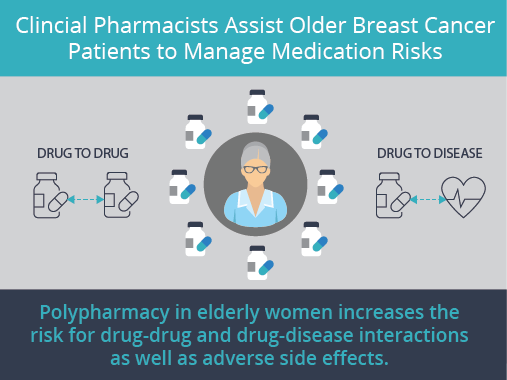
The clinical pharmacist can play a significant role in helping women with breast cancer achieve the best possible treatment outcomes and help reduce the impact of adverse side effects.
Over the years, clinical pharmacists have become crucial members of the multidisciplinary teams who treat breast cancer patients.
Cancer treatment can be more challenging and complicated for older women due to a progressive decline in organ function.
This can reduce the elimination of cancer drugs through renal excretion and liver metabolism, increasing the risk for side effects and treatment-related toxicities as well as normal tissue tolerance.
Clinical pharmacists can provide expert knowledge on cancer treatment pharmacokinetic properties including drug absorption, the volume of distribution, renal elimination, and liver metabolism to help guide treatment decisions and options.
Medication Expertise:
Clinical pharmacists are medication experts poised to deliver a wide variety of services to breast cancer patients, including education, monitoring adverse drug effects, and evaluating drug-drug, drug-gene, and drug-disease interactions.
The increased occurrence of comorbidities and polypharmacy in elderly women increases the risk for drug-drug, drug-gene, and drug-disease interactions as well as cumulative adverse effects.
Pharmacists are uniquely qualified to reconcile a patient’s medication list and identify potential interactions associated with the patient’s use of dietary and nutritional supplements, herbals, and over-the-counter medications and how these interactions can increase the risk of treatment complications and/or toxicities.
Resource And Education:
Additionally, clinical pharmacists can be key resources in educating and managing the adverse effects and toxicities of breast cancer treatment.
Many adverse effects of chemotherapy can be managed with patient education and supportive care, thereby increasing medication adherence and regimen tolerance.
Supportive care services may include treatment for nausea and vomiting, pain management, constipation and diarrhea, anemia, anticoagulation, and treatment with anti-infectives.
Elderly women on chemotherapy for advanced or hormone receptor-negative breast cancer are at increased risk of developing myelosuppression secondary to their anticancer regimen.
Through laboratory monitoring, clinical pharmacists can help identify women who should be prescribed hematopoietic growth factors to combat the myelotoxicity of chemotherapy.
From treatment recommendations and patient education to side effects and drug interaction management, clinical pharmacists play an integral role in ensuring optimal treatment outcomes and improved quality of life for older women fighting breast cancer.
References:
Powers J. (2018). The Role of the Pharmacist as Part of a Multidisciplinary Cancer Care Team. Pharmacy Times. 19: 12: 27.
Lewis JA. (2017). The Oncology Care Pharmacist in Health System Pharmacy. Pharmacy Times. 20: 41: 32.
Retrieved from https://www.pharmacytimes.com/publications/health-system-edition/2017/january2017/the-oncology-care-pharmacist-in-healthsystem-pharmacy








